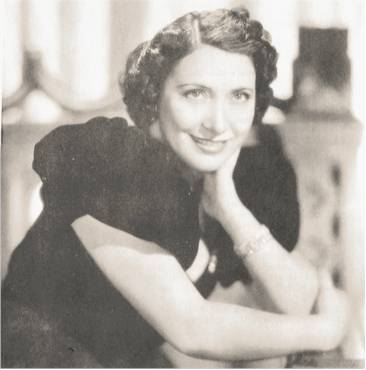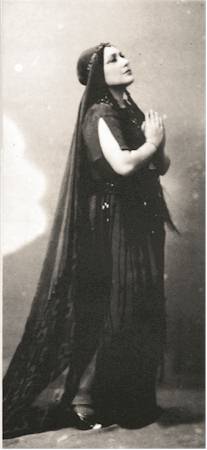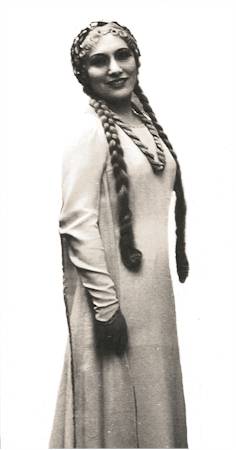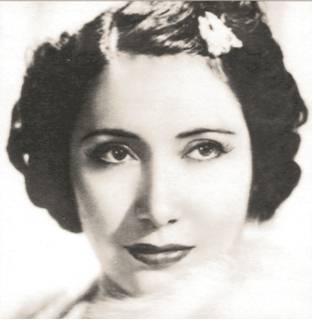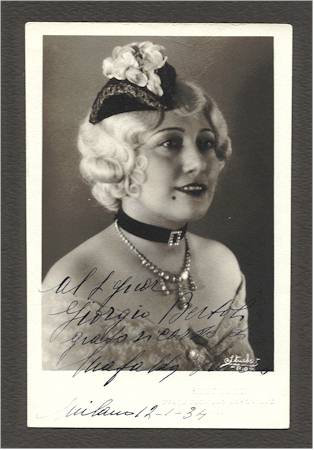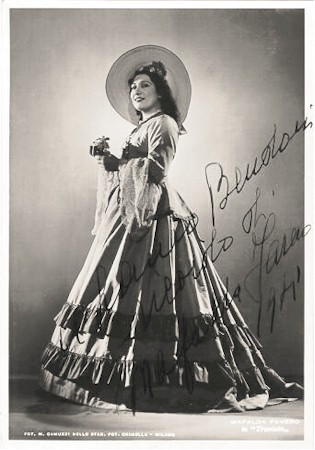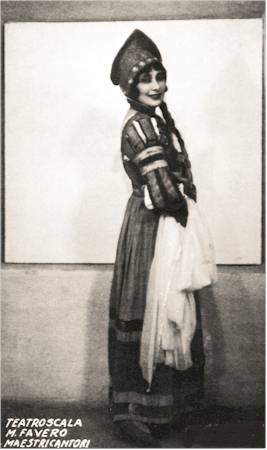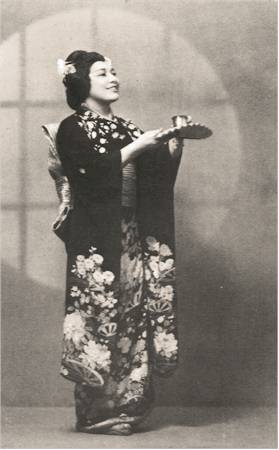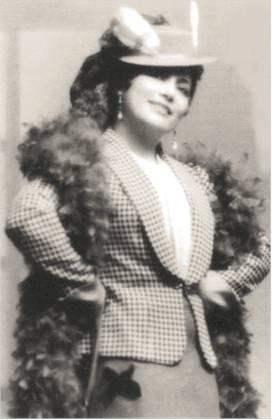Italian soprano, 1903 - 1981
Biographical notes: Mafalda Favero was born in 1903 in Portomaggiore near Ferrara. She studied singing at the Conservatory of Bologna under Alessandro Vezzani, then under the direction of the composer Franco Alfano. She made her official debut as Liù in Puccini’s Turandot at Parma in 1927 (although she had sung Lola at Cremona under the pseudonym of Maria Bianchi the year before). By 1929 Arturo Toscanini invited her to make her Scala debut as Eva in Wagner’s Die Meistersinger von Nürnberg (!). She became a celebrity at this opera house and performed there every season until 1949. Her repertoire not only included the “light” parts such as Zerlina, Adina, Norina, Juliette, Carolina in Il Matrimonio di segreto, Flotow’s Martha, Nedda and Susanna, but also Eva, Elsa in Lohengrin, Adriana, Cio-Cio-San, Manon Lescaut,Thaïs and Zazà. Mafaldo Favero was certainly at her best in the lyric repertoire and there were a number of roles she was closely identified with the roles of Mimì, Liù, Manon, Violetta, Lodoletta, Iris, Suzel and the two Margheritas (Mefistofele and Faust). She also created a number of world premieres, appearing in Lattuada’s Le Preziose Ridicole, Alfano’s L’Ultimo Lord (1930), Mascagni’s Pinotta (1932), Zandonai’s Farsa amorosa (1933) and Wolf-Ferrari’s two operas Campiello (1936) and La Dama Boba (1939). Mafalda Favero ventured outside Italy on a few but notable occasions. She appeared two seasons at Covent Garden, 1937 and 1939, where her roles were Norina, Liù and Zerlina. It was not until 1937, that she made her Met debut in one of her signature roles - as Mimì in La Bohème, opposite Jussi Björling as Rodolfo, who was also making his house debut. Favero was very wise to turn down an offer to sing Desdemona but she could not resist to add the title role of Madame Butterfly to her repertoire. The part is considered a “voice killer”, and it was probably this part that harmed her small voice significantly. When peace was restored to Italy, Mafalda Favero sang Act 3 from Manon Lescaut under Toscanini’s direction, in the inaugural concert of the rebuilt La Scala on 11 May 1946. She died in Milan aged 78.
Liù (left) and Margherita in Boito’s “Mefistofele” (right)
“ Flammen, perdonami from Mascagni’s Lodoletta is the disc I love most - not for the voice, but for the emotion that I put into the aria at that recording session...” Mafalda Favero
As Manon Lescaut
As Violetta
As Eva in 1928/29 (her Scala debut) Comment:
Like many other singers who specialized in the verismo repertoire, Mafalda Faavero was more concerned with dramatic expression that with the purely “instrumental” aspects of tone production. She is quoted as saying that “emotion was the most vital aspect of any heroine I
undertook.” The consequence was a rather early decline of the voice. In her recordings made after 1945, she showed serious vocal problems (intonation!). Her Manon (performance at la Scala
in 1947) was characterized by compensating screams, sobs and sighs. However, there are some recordings to which I will always return. Four of them I would choose
for “the desert island”: Her recordings of Mimì and Suzel, Lodoletta’s Flammen, perdonami and Desdemona’s Ave Maria (this may come as a surprise, since she never sang the role on stage).
When listening to these recordings I do not hesitate to agree with Davide Annacchini who wrote:
“The personality of this singer was characterized by the presents of elements like innocence and coyness, intimism and exuberance, an ideal combination for rendering the joyous freshness of
youth and the subtle malices of seduction with immediate spontaneity.”
As Cio-Cio-San Favero’s complete recordings:
-> Columbia: (1928-1930) - - Sola nei prim’anni (Einsam in trüben Tagen) (Elsa in Lohengrin / Wagner) - Aurette a cui sì spesso (Euch Lüften, die mein Klagen) (Elsa in Lohengrin / Wagner) - L’altra notte in fondo al mare (Margherita in Mefistofele / Boito) - Spunta l’aurora pallida (Margherita in Mefistofele / Boito) - Non mi resta che il pianto (Suzel in L’Amico Fritz / Mascagni) - Stridono lassù (Nedda in I Pagliacci / Leoncavallo) - Donde lieta uscì (Mimì in La Bohème / Puccini) - Sono andati (Mimì in La Bohème / Puccini) - Ancora un passo orvia (Title role in Madame Butterfly / Puccini) - Tu che di gel sei cinta (Liù in Turandot / Puccini)
-> Voce del padrone: - - Ave Maria (Desdemona in Otello / Verdi / 1941) - Suzel, buon dì with Tito Schipa (Suzel in L’Amico Fritz / Mascagni / 1937) - Son pochi fiori (Suzel in L’Amico Fritz / Mascagni / 1937) - In quelle trine morbide (Title role in Manon Lescaut / Puccini / 1937) - Sì, mi chiamano Mimì (Mimì in La Bohème / Puccini / 1937) - O soave fanciulla with Alessandro Ziliani (Mimì in La Bohème / Puccini / 1935) - Bimba dagli occhi picni di malia with Alessandro Ziliani (Title role in Madame Butterfly / Puccini / 1936)
- Signore ascolta (Title role in Madame Butterfly / Puccini / 1937) - O tu che ‘l sai (Margherita in L’Ombra / Bottachiari / 1946) - Massenet / Manon / Guarneri / La Scala, 1947 live (highlights)
In the title role of Leoncavallo’s “Zazà”
|
||||||||||||||||||||||||||||||||
